Alberta
Province calling out for volunteers and honouring Albertans who support their community

From the Province of Alberta
Call to action for COVID-19 volunteers
Albertans have always risen to the call of duty when our province has been challenged, and the COVID-19 pandemic is no different. Today, the Government of Alberta is launching a new tool to connect Albertans with volunteer opportunities during this unprecedented global crisis, and launching the Northern Lights program to recognize Albertans who volunteer to support their community.
While physical distancing and gathering restrictions are in place, there is still a need for healthy volunteers to help those in need with countless opportunities to do so. The Alberta Cares Connector embraces the Alberta spirit of supporting the vulnerable by offering our assistance, skills and time to those who need it most.
“Volunteerism is the Alberta way. I continue to be inspired by many acts of Albertan generosity and compassion. From the Sikh community providing meals for truckers keeping our supply lines open, to a Calgary woman in her time of mourning sewing masks for her community, to kids leaving care packages on their elderly neighbours’ doorsteps – the examples of generosity and selflessness are endless. The Alberta Cares Connector will build off this community solidarity and ensure that those who can help will make the biggest impact during this time when support is acutely needed. The Northern Lights program keeps a platform commitment to spotlight those who personify the Alberta sprit by giving back to our community through volunteerism.”
Volunteers are the foundation for many community organizations providing social support and assistance to those in need. Alberta has more than 26,400 non-profit organizations and, each year, more than 1.6 million Albertans provide more than 262 million volunteer hours to support the non-profit and voluntary sector at a value of $5.6 billion.
“Albertans are proud to have the highest volunteer rates across Canada, and we take action in countless ways to meet the needs of our communities and neighbours. During this unprecedented crisis, Albertans understand that the need for volunteerism and social support is urgent. And, once again, they have demonstrated their commitment to their neighbours and communities through selfless acts of service. The Alberta Cares Connecter will assist Albertans who want to help at this time by connecting them with local volunteer opportunities to help those most in need.”
This new tool will build on the success of every day Albertans who answered the call to action by providing an easy one-stop-shop for those looking for service opportunities. The Alberta Cares Connector will ensure those organizations and programs that depend on the generosity and assistance of volunteers are able to continue to provide support to those in need.
“We are thrilled about our collaboration with the province on the new Alberta Cares Connector. We’ve supported volunteering through floods and fires and built a platform that could be flexible to allow volunteers to rise to any challenge. Alberta Cares Connector will continue to evolve and create new ways for community organizations to connect with current and prospective volunteers who want to answer the call to help others in need.”
Volunteers and volunteer organizations must follow all necessary precautions to prevent the spread of COVID-19 to protect themselves and those they help. More information on safety and physical distancing guidelines can be found at alberta.ca/COVID19.
Ways people can help
- Volunteering at food banks.
- Sewing masks or scrub bags for front-line health-care workers.
- Providing meals for essential service workers, like truckers.
- Picking up groceries for those unable to leave their homes.
- Packing and delivering essential needs for vulnerable Albertans.
- Donating blood through myaccount.blood.ca.
- Donating items to shelters in need.
- Reaching out to seniors through positive messages or phone calls.
Northern Lights Volunteer Recognition Program
Government is also launching the Alberta Northern Lights Volunteer Awards to honour everyday heroes as the province responds to the COVID-19 pandemic. The honourees will be nominated by fellow Albertans and selected for profiling on the program’s website and through social media.
There are no requirements for hours of service, and any individual or group who helps out in their community is eligible for an award. The nomination submission requests a brief story about the nominee’s contribution. Nominations will be accepted online on an ongoing basis.
“Volunteers are the heart of non-profits and right now we need Albertans to give their time and talents to community organizations. Any act of volunteerism, done safely, will make a huge difference. That’s why the Government of Alberta is making a point of recognizing those individuals, businesses and organizations who have answered the call in this time of need. Let’s share the uplifting and inspirational stories of special volunteers who are brightening the lives of others and their communities during this difficult time by nominating them for an Alberta Northern Lights Volunteer Award. ”
The program is now accepting nominations.
Alberta
Preston Manning: Canada is in a unity crisis

 Preston Manning
Preston Manning
A Canada West Assembly would investigate why
The election of a minority Liberal government on Monday, and the strong showing of the Conservative party under Pierre Poilievre, cannot mask the fact that Canada remains seriously fractured on many fronts. Thus, one of the primary tasks of the Carney government will be to unite us for the sake of our own national well-being — not simply for the sake of presenting a strong front in future dealings with the United States.
But how is that to be done? When parliament meets as scheduled on May 26, will the government’s throne speech acknowledge the main sources of national disunity and propose the immediate adoption of remedial measures? Or will it ignore the problem entirely, which will serve to further alienate Quebec and the West from Ottawa and the rest of Canada, and weaken Canada’s bargaining position vis a vis the United States?
The principal tactic employed by the Liberal party to unite Canadians behind it in the recent election was to employ the politics of fear — fear of U.S. President Donald Trump trying to “break us so that America can own us,” as Liberal Leader Mark Carney has repeatedly said.
But if the only way to unite Canadians is through the promotion of anti-Americanism fostered by fear of some alleged American takeover — if reaction to the erratic musings of an American president is the only way to motivate more Canadians to vote in a federal election — then not only national unity, but Canadian democracy itself, is in critical condition.
We need to pinpoint what actually is fracturing the country, because if we can clearly define that, we can begin the process of removing those divisive elements to the largest extent possible. Carney and the Liberals will of course declare that it is separatist agitations in Quebec and now the West that is dividing us, but these are simply symptoms of the problem, not the cause.
Here, then, is a partial list of what underpins the division and disunity in this country and, more importantly, of some positive, achievable actions we can take to reduce or eliminate them.
First and foremost is the failure to recognize and accommodate the regional character of this country. Canada is the second-largest country by area on the planet and is characterized by huge geographic regions — the Atlantic, Central Canada, the Prairies, the Pacific Coast and the Northern territories.
Each of these regions — not just Quebec — has its own “distinctive” concerns and aspirations, which must be officially recognized and addressed by the federal government if the country is to be truly united. The previous Liberal government consistently failed to do this, particularly with respect to the Prairies, Pacific and Northern regions, which is the root of much of the alienation that even stimulates talk of western separation.
Second is Ottawa’s failure to recognize and treat the natural resources sector as a fundamental building block of our national economy — not as a relic from the past or an environmental liability, as it was regarded by the government of former prime minister Justin Trudeau.
Will the throne speech announce another 180-degree turn for the Liberal government: the explicit recognition that the great engine of the Canadian economy and our economic recovery is not the federal government, as Carney has implied, but Canada’s agricultural, energy, mining, forestry and fishery sectors, with all the processing, servicing, manufacturing and knowledge sectors that are built upon them?
A third issue we’ve been plagued with is the division of Canadian society based on race, gender, sexual preferences and other identity traits, rather than focusing on the things that unite us as a nation, such as the equality of all under the law. Many private-sector entities are beginning to see the folly of pursuing identity initiatives such as diversity, equity and inclusion that divide rather than unite, but will the Liberal government follow suit and will that intention be made crystal clear in the upcoming throne speech?
A final issue is the federal government’s intrusion into areas of provincial jurisdiction — such as natural resources, health, municipal governance, along with property and civil rights — which is the principal cause of tension and conflict between the federal and provincial governments.
The solution is to pass a federal “act respecting provincial jurisdiction” to repeal or amend the statutes that authorize federal intrusions, so as to eliminate, or at least reduce, their intrusiveness. Coincidentally, this would be a legislative measure that both the Conservatives and the Bloc could unite behind if such a statute were to be one of the first pieces of legislation introduced by the Carney government.
Polling is currently being done to ascertain whether the election of yet another Liberal government has increased the growing estrangement of western Canada from Ottawa and the rest of Canada, notwithstanding Carney’s assurances that his minority government will change its policies on climate change, pipelines, immigration, deficit spending and other distinguishing characteristics of the discredited Trudeau government.
The first test of the truthfulness of those assurances will come via the speech from the throne and the follow-up actions of the federal government.
Meanwhile, consultations are being held on the merits and means of organizing a “Canada West Assembly” to provide a democratic forum for the presentation, analysis and debate of the options facing western Canada (not just Alberta) — from acceptance of a fairer and stronger position within the federation based on guarantees from the federal government, to various independence-oriented proposals, with votes to be taken on the various options and recommendations to be made to the affected provincial governments.
Only time will tell whether the newly elected Carney government chooses to address the root causes of national disunity. But whether it does so or not will influence the direction in which the western provinces and the proposed Canada West Assembly will point.
Preston’s Substack is free today.
But if you enjoyed this post, you can tell Preston’s Substack that their writing is valuable by pledging a future subscription.
Alberta
Premier Danielle Smith hints Alberta may begin ‘path’ toward greater autonomy after Mark Carney’s win
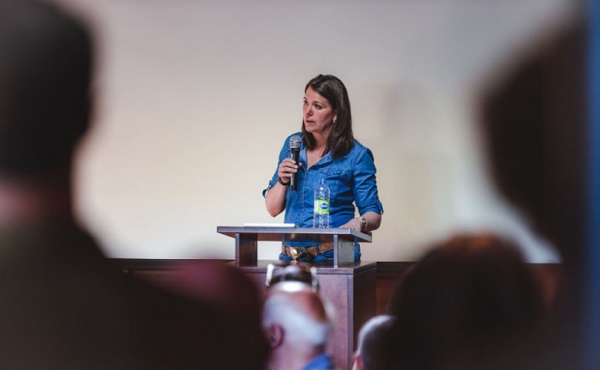
From LifeSiteNews
Alberta’s premier said her government will be holding a special caucus meeting on Friday to discuss Alberta’s independence.
Alberta Premier Danielle Smith hinted her province could soon consider taking serious steps toward greater autonomy from Canada in light of Mark Carney and the Liberal Party winning yesterday’s federal election.
In a statement posted to her social media channels today, Smith, who is head of Alberta’s governing United Conservative Party, warned that “In the weeks and months ahead, Albertans will have an opportunity to discuss our province’s future, assess various options for strengthening and protecting our province against future hostile acts from Ottawa, and to ultimately choose a path forward.”
“As Premier, I will facilitate and lead this discussion and process with the sincere hope of securing a prosperous future for our province within a united Canada that respects our province’s constitutional rights, facilitates rather than blocks the development and export of our abundant resources, and treats us as a valued and respected partner within confederation,” she noted.
While Smith stopped short of saying that Alberta would consider triggering a referendum on independence from Canada, she did say her government will be holding a “special caucus meeting this Friday to discuss this matter further.”
“I will have more to say after that meeting is concluded,” she noted.
Smith’s warning comes at the same time some pre-election polls have shown Alberta’s independence from Canada sentiment at just over 30 percent.
Monday’s election saw Liberal leader Mark Carney beat out Conservative rival Pierre Poilievre, who also lost his seat. The Conservatives managed to pick up over 20 new seats, however, and Poilievre has vowed to stay on as party leader, for now.
In Alberta, almost all of the seats save two at press time went to conservatives.
Carney, like former Prime Minister Justin Trudeau before him, said he is opposed to new pipeline projects that would allow Alberta oil and gas to be unleashed. Also, his green agenda, like Trudeau’s, is at odds with Alberta’s main economic driver, its oil and gas industry.
The federal government under Trudeau pushed since 2015 a radical environmental agenda similar to the agendas being pushed the World Economic Forum’s “Great Reset” and the United Nations “Sustainable Development Goals.”
The Carney government has also pledged to mandate that all new cars and trucks by 2035 be electric, effectively banning the sale of new gasoline- or diesel-only powered vehicles after that year.
The reduction and eventual elimination of the use of so-called “fossil fuels” and a transition to unreliable “green” energy has also been pushed by the World Economic Forum (WEF) – the globalist group behind the socialist “Great Reset” agenda – an organization in which Trudeau and some of his cabinet are involved.
Smith: ‘I will not permit the status quo to continue’
In her statement, Smith noted that she invited Carney to “immediately commence working with our government to reset the relationship between Ottawa and Alberta with meaningful action rather than hollow rhetoric.”
She noted that a large majority of Albertans are “deeply frustrated that the same government that overtly attacked our provincial economy almost unabated for the past 10 years has been returned to government.”
Smith then promised that she would “not permit the status quo to continue.”
“Albertans are proud Canadians that want this nation to be strong, prosperous, and united, but we will no longer tolerate having our industries threatened and our resources landlocked by Ottawa,” she said.
Smith praised Poilievre for empowering “Albertans and our energy sector as a cornerstone of his campaign.”
Smith was against forced COVID jabs, and her United Conservative government has in recent months banned men from competing in women’s sports and passed a bill banning so-called “top and bottom” surgeries for minors as well as other extreme forms of transgender ideology.
-

 Alberta2 days ago
Alberta2 days agoPremier Danielle Smith responds to election of Liberal government
-
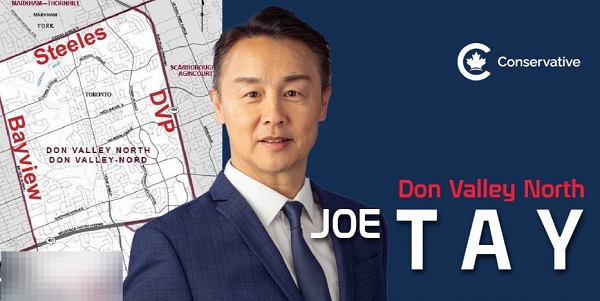
 2025 Federal Election2 days ago
2025 Federal Election2 days agoIn Defeat, Joe Tay’s Campaign Becomes a Flashpoint for Suspected Voter Intimidation in Canada
-

 Banks2 days ago
Banks2 days agoTD Bank Account Closures Expose Chinese Hybrid Warfare Threat
-
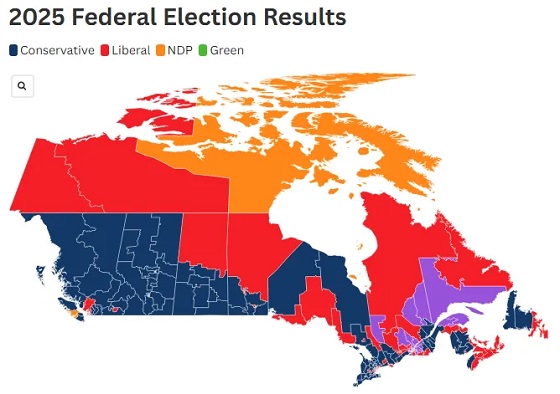
 2025 Federal Election2 days ago
2025 Federal Election2 days agoPost election…the chips fell where they fell
-

 Alberta2 days ago
Alberta2 days agoNew Alberta Election Act bans electronic vote counting machines, lowers threshold for recalls and petitions
-

 Alberta2 days ago
Alberta2 days agoHours after Liberal election win, Alberta Prosperity Project drumming up interest in referendum
-
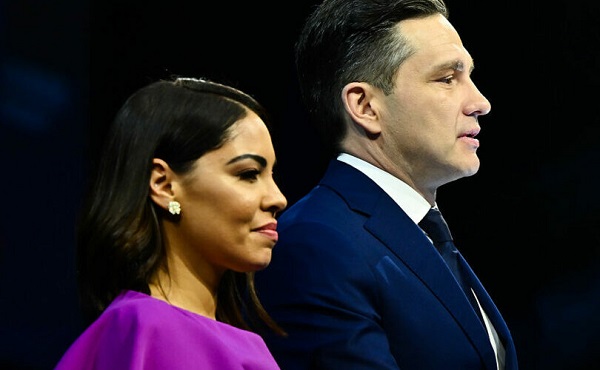
 2025 Federal Election2 days ago
2025 Federal Election2 days agoPoilievre loses seat but plans to stay on as Conservative leader
-
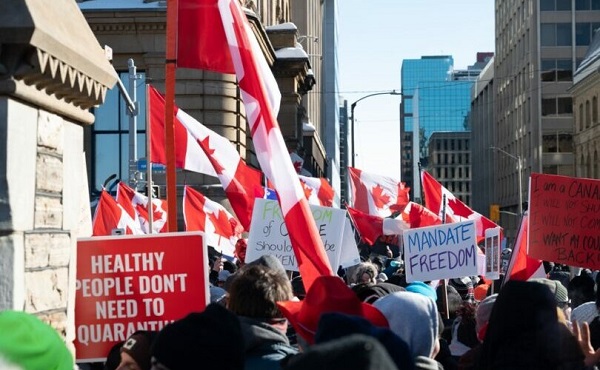
 COVID-192 days ago
COVID-192 days agoFreedom Convoy leaders’ sentencing judgment delayed, Crown wants them jailed for two years



